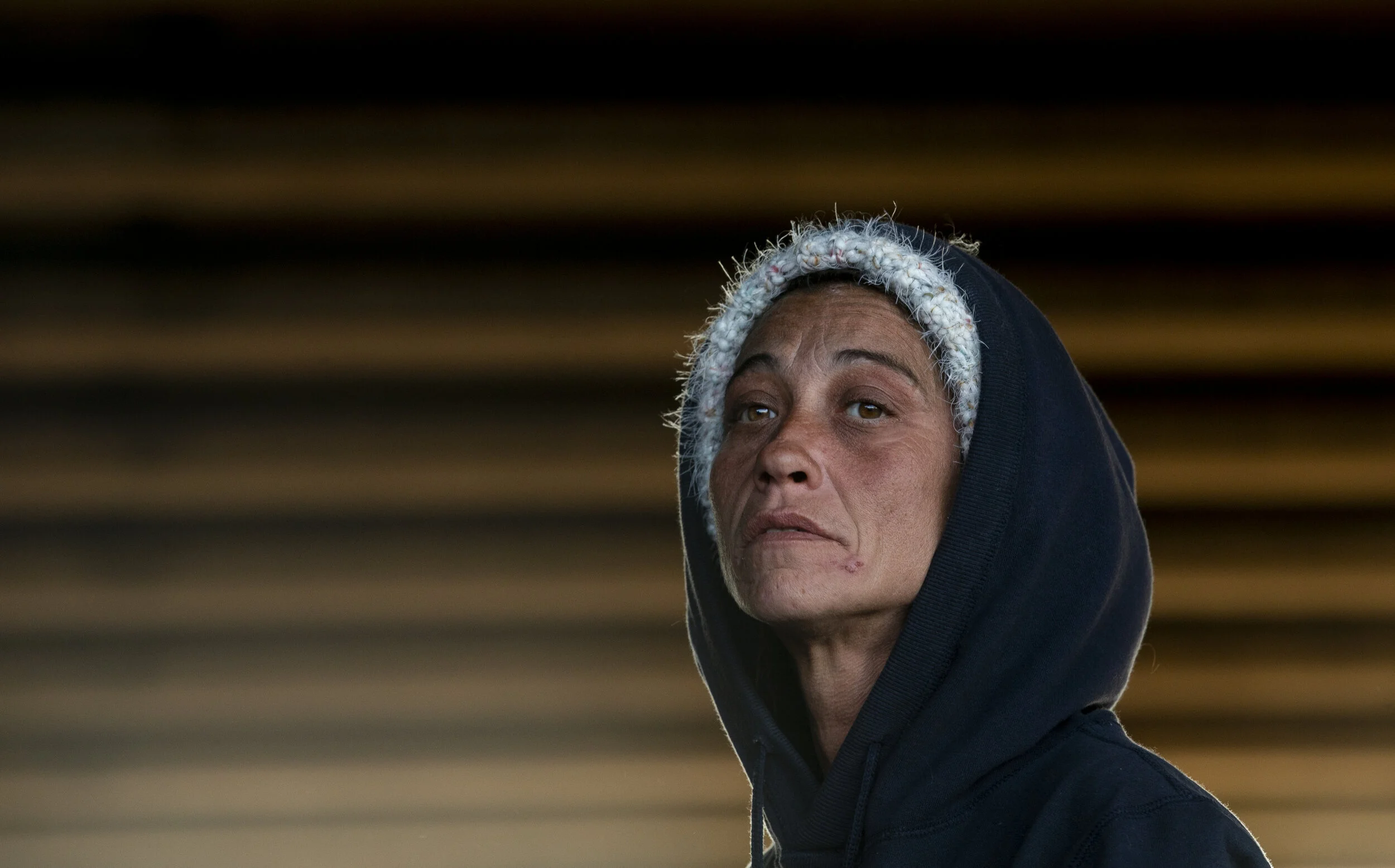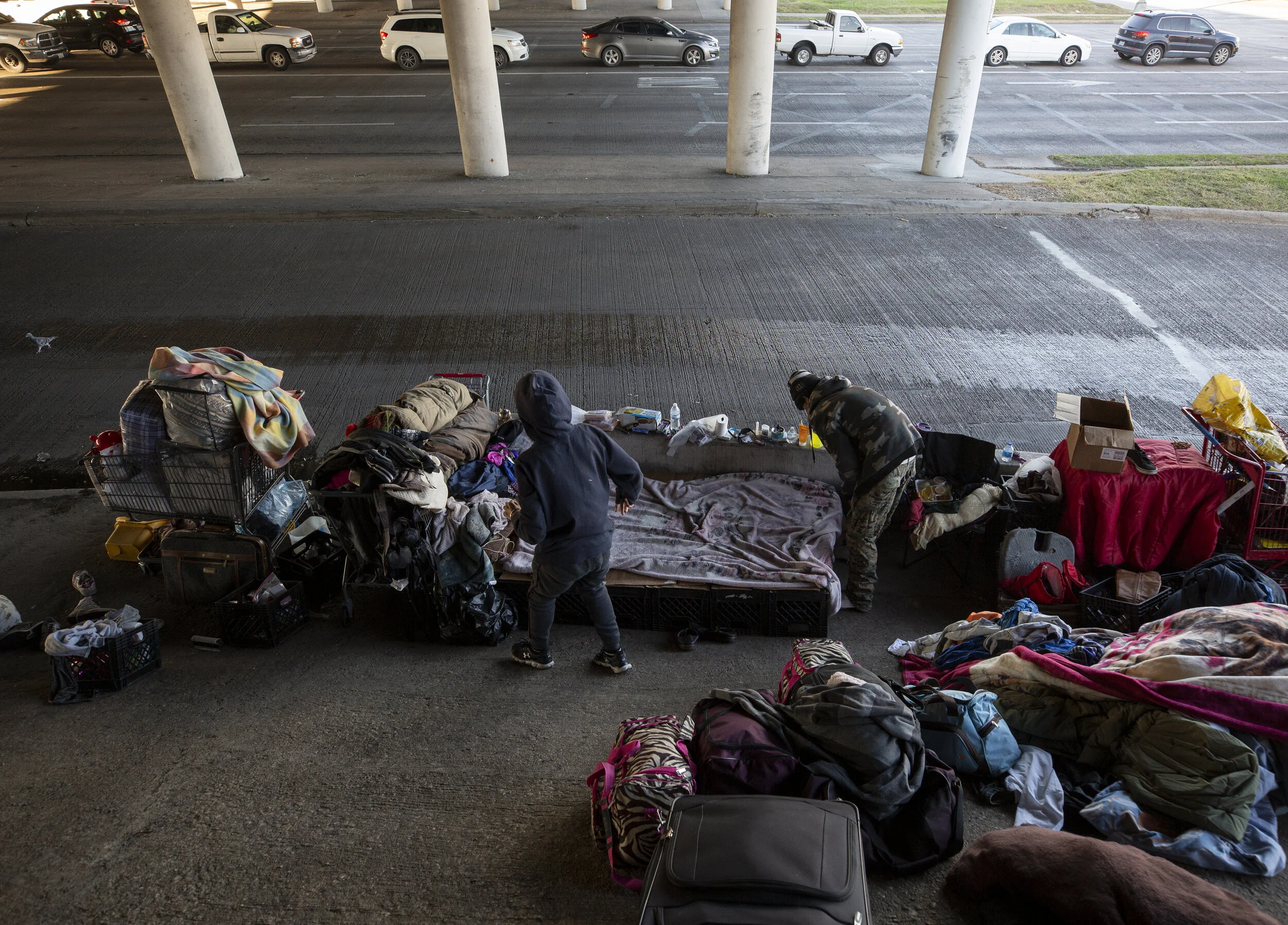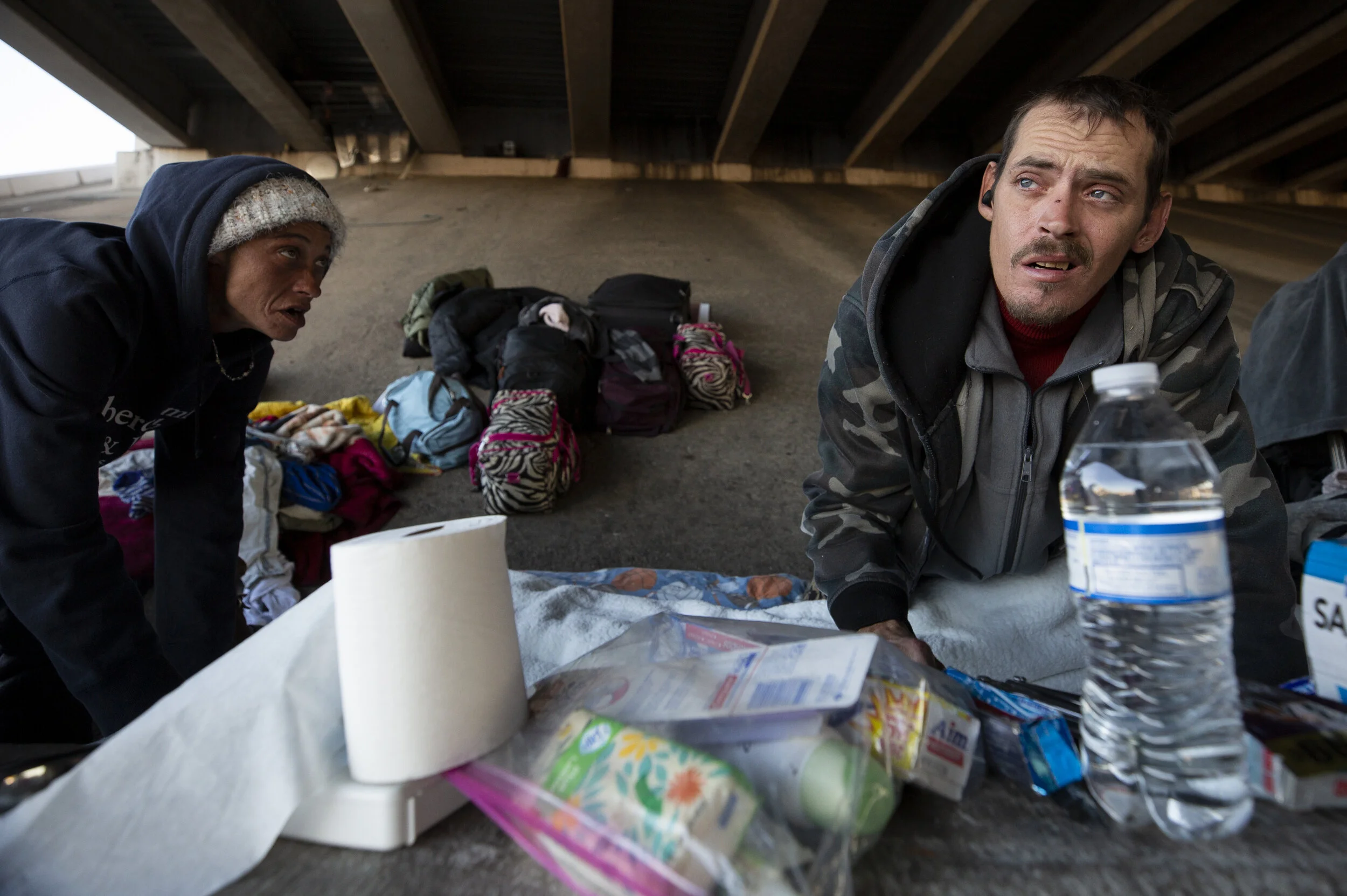
Homelessness is risky. It takes time to learn the skills for living on the street.
Certain she was going to get killed, Melissa Fay cussed the whole way down to the corner the first time she washed windows.
What if a driver came out of the car at her? What if they pulled a gun? And besides that - how would she make money? But it worked. Now she and her husband live where they work: under an overpass, washing windows to make money.

"It's about survival. It's about having money out here,” she said.

Fay and her husband, Michael Phillips, live at the intersection of Beechnut and the Sam Houston Tollway in organized chaos. They used to live in a two-bedroom house in Brazoria. Phillips worked for an energy company; Fay did online multilevel marketing. Now they store their possessions in suitcases and shopping carts and have a makeshift bed of crates stacked against the concrete barrier.

Fay and her husband have been living on the streets of Houston since Hurricane Harvey. Making it on the streets is a learning curve. Each one of Harris County’s 3,567 homeless people – especially the 1,515 unsheltered – has to learn the survival skills Fay cultivated.

After two years on the street, Fay is friendly with almost everyone. She knows the deputies from the Harris County Precinct 5 Constable’s office and the Houston police who come around.

Fay checks daily on a friends who live along Beechnut Street. She keeps snack bags and $1 doughnut boxes for other homeless. Anyone’s welcome.
“If you smoke crack, if you smoke weed, you’re still human and you still have to eat,” she said. “I was a drug addict. I try not to look at these people any different.”

The art of hitting windows is summed up in one mantra: “Don’t take any ‘no.’”
When cars stop at the light, Fay approaches, squeegee in hand. She looks straight ahead or has shades on or earbuds in. There’s no music playing, but the point is, she can’t hear or see someone say “no.”

It’s dangerous to be homeless and alone. Fay says hi to almost everyone – friends like Uncle Red always greet her with a hug. Uncle Red is also homeless on Beechnut Street.

With the money they make window washing, Fay and Phillips buy their own food at the Dollar Store or H-E-B. If other window washers put money in, they eat too. On nice days they lay out a blanket and cook food on a small grill on the grass by the bank across from the intersection.
She likes strawberry-lemonade vodka and won’t say no to a good Jell-O shot. Sometimes a shot or two of liquor keeps her warm at night.
But when Fay is sick, she prefers an ice pop.

On nights when their phones and power banks run out of juice, Fay and Phillips sleep outside a Boost Mobile store. The owner knows them, they said, and leaves a power cord out so they can charge overnight.
They’re ready with layers of blankets for the winter. But they hope they won’t need them. They’re saving to go into a motel that will accept them and their dogs, and then, they hope, to an apartment.
“If an apartment would just give me the chance,” Fay said, “I could pay for it.”










Homelessness is risky. It takes time to learn the skills for living on the street.
Certain she was going to get killed, Melissa Fay cussed the whole way down to the corner the first time she washed windows.
What if a driver came out of the car at her? What if they pulled a gun? And besides that - how would she make money? But it worked. Now she and her husband live where they work: under an overpass, washing windows to make money.
"It's about survival. It's about having money out here,” she said.
Fay and her husband, Michael Phillips, live at the intersection of Beechnut and the Sam Houston Tollway in organized chaos. They used to live in a two-bedroom house in Brazoria. Phillips worked for an energy company; Fay did online multilevel marketing. Now they store their possessions in suitcases and shopping carts and have a makeshift bed of crates stacked against the concrete barrier.
Fay and her husband have been living on the streets of Houston since Hurricane Harvey. Making it on the streets is a learning curve. Each one of Harris County’s 3,567 homeless people – especially the 1,515 unsheltered – has to learn the survival skills Fay cultivated.
After two years on the street, Fay is friendly with almost everyone. She knows the deputies from the Harris County Precinct 5 Constable’s office and the Houston police who come around.
Fay checks daily on a friends who live along Beechnut Street. She keeps snack bags and $1 doughnut boxes for other homeless. Anyone’s welcome.
“If you smoke crack, if you smoke weed, you’re still human and you still have to eat,” she said. “I was a drug addict. I try not to look at these people any different.”
The art of hitting windows is summed up in one mantra: “Don’t take any ‘no.’”
When cars stop at the light, Fay approaches, squeegee in hand. She looks straight ahead or has shades on or earbuds in. There’s no music playing, but the point is, she can’t hear or see someone say “no.”
It’s dangerous to be homeless and alone. Fay says hi to almost everyone – friends like Uncle Red always greet her with a hug. Uncle Red is also homeless on Beechnut Street.
With the money they make window washing, Fay and Phillips buy their own food at the Dollar Store or H-E-B. If other window washers put money in, they eat too. On nice days they lay out a blanket and cook food on a small grill on the grass by the bank across from the intersection.
She likes strawberry-lemonade vodka and won’t say no to a good Jell-O shot. Sometimes a shot or two of liquor keeps her warm at night.
But when Fay is sick, she prefers an ice pop.
On nights when their phones and power banks run out of juice, Fay and Phillips sleep outside a Boost Mobile store. The owner knows them, they said, and leaves a power cord out so they can charge overnight.
They’re ready with layers of blankets for the winter. But they hope they won’t need them. They’re saving to go into a motel that will accept them and their dogs, and then, they hope, to an apartment.
“If an apartment would just give me the chance,” Fay said, “I could pay for it.”